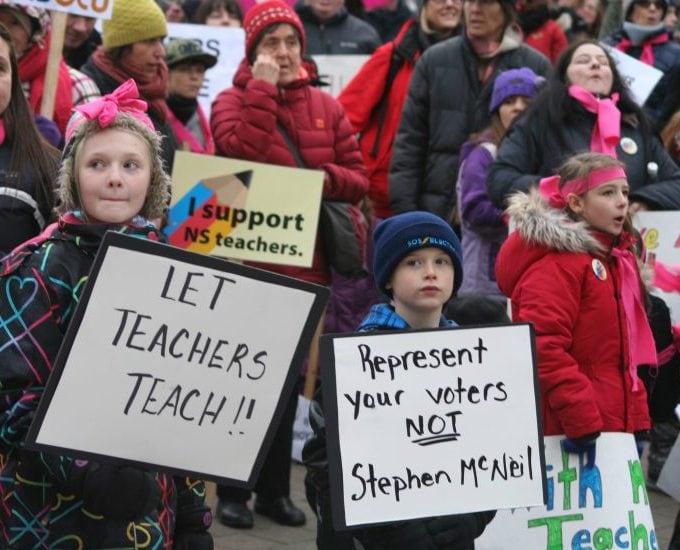
Educators for Social Justice – NS and Nova Scotia Parents for Public Education January 2020
The Educators for Social Justice – Nova Scotia (ESJ-NS) and the Nova Scotia Parents for Public Education (NSPPE) have just released their Manifesto for Progressive Public Education which identifies four major threats to progressive public education in this province: the weakening of community engagement, the impact of austerity, the weakening of the Nova Scotia Teachers Union and the influence of right-wing think tanks.
The Manifesto grew out of the ESJ-NS’s first symposium on September 29 2018 “An Agenda for Progressive Education” and has been a collaborative effort on the parts of ESJ-NS and NSPPE members.
Definition of progressive public education:
We live in a society where socio-economic disparity is increasing. While our province’s prosperity has increased over the last fifty years, and the rich get richer, wages for most people have fallen. Intergenerational socio-economic mobility is decreasing or stagnant.
Our society has inherited and still experiences the effects of over 400 years of colonialism, slavery, and racial segregation. These factors have contributed to Nova Scotia having one of the highest rates of child poverty in the country, which has become one of the biggest challenges faced by our education system.
Progressive public education has traditionally been one of the most powerful social programs directed at resisting these trends. Canada has one of the best public education systems in the world, and we believe that we must strengthen it as a program for social justice for every student.
Public education has been under attack recently in Nova Scotia. The notion of teacher professionalism has been a prime target. Not so long ago, teachers with their specialized training, entrusted with the care and development of children, were respected, and fully involved in the setting of the rules and curricula that governed their work. Another aspect of this was the involvement of parents and other citizens through locally-elected school boards. In P-12 education, the assault against teachers’ collective bargaining, the removal of principals and educational specialists from the bargaining unit and the elimination of school boards is part of a not-so-hidden strategy of taking control of education away from citizens and placing it within the hands of the current government and its bureaucrats, many of whom are not educators.
Progressive public education is education that helps every child attain the skills and knowledge they need to be lifelong learners and socially responsible citizens in an ever-changing world. These include problem solving, critical thinking, communication, ability to collaborate, and empathy. It is predicated on the assumption that every child is unique, and has unique needs and capabilities – physical, emotional, developmental, social, spiritual, and intellectual. In addition, each child has a cultural, racial, economic, and gender identity, and progressive public education is designed to prepare them to succeed economically and socially, regardless of their background.
Progressive education requires collaboration and respect on the part of all stakeholders, especially educators, both administrators and teachers. It promotes active engagement in their communities by students as well as collaboration between educators, families, and government services.
ESJ-NS and NS Parents for Public Education are working together to promote progressive public education in this province. We have identified several challenges to it: the weakening of community engagement, the impact of austerity, the weakening of the Nova Scotia Teachers Union, and right wing think tanks feeding into a hostile media.
1. Weakening of community engagement
Given the importance of community engagement, it is disappointing that the Nova Scotia Liberal government has, in the past six years, weakened or destroyed opportunities for public engagement in the education system, concentrating power in the hands of government officials and diminishing or eliminating the institutions of citizen involvement.
It has wiped out elected school boards, left the role of School Advisory Councils (SACs) undefined, and changed education policy in an arbitrary and high-handed fashion. It has centralized curriculum development and decision-making in the Department of Education and Early Childhood Development, and this has resulted in a lack of local input from the regions.
We believe the following action items could strengthen community engagement in education:
● Government should restore regional, elected councils or boards which would have decision-making power over some aspects of curriculum and other matters.
● Government should support and augment the role of the School Advisory Councils.
● The education system should strengthen relationships with parents and community, and take steps to support equitable representation within and between SACs.
2. The impact of austerity
Austerity is a political program that aims to reduce the size and impact of government and governmental institutions by cutting revenues (mostly taxes) and subsequently cutting expenditures (mostly social programs), asserting that it can no longer afford to provide those services.
Education is part of the Nova Scotia government’s austerity agenda. This has meant cuts to education, resulting in the inadequate implementation of the inclusion policy, insufficient staff hiring and less funding for professional development. This has led to the triage of kids with special needs, and long wait times for assessment, which has forced those with the means to pursue private sector solutions while those without means forego attention. It has also meant dwindling supports within the classroom, and larger class sizes.
With the erosion of public education due to austerity, creeping privatization occurs as parents with means choose private schools, and parents who have children with disabilities get vouchers for private schools. The centralization of power, a byproduct of austerity, also results in more standardized curriculum materials and tests, which tends to favour corporations such as Pearson and Nelson over locally produced materials.
We believe the following action items will combat the erosion of our public education by austerity measures:
● Government should provide adequate funding for inclusion, more funding for professional development, adequate maintenance funds for school buildings and salaries that keep up with the NS cost of living and the median salary for employees across Canada.
● Education funding should keep class sizes to manageable levels which allow more opportunities for individual and small group support, and allow for more preparation/collaboration time for teachers.
● Government should invest meaningfully in poverty reduction (raise the minimum wage, increase social assistance, affordable housing initiatives, and other, similar social programmes).
● Citizens should resist privatization where it occurs e.g. private tutoring firms, charter schools, government funding for private schools.
● Local curriculum development should be supported.
3. Weakening of the Nova Scotia Teachers Union
This government has attacked the teachers union and eroded collective bargaining. The government has restricted the right to strike, restricted the scope of what can be negotiated, and taken principals, vice-principals, and some specialists (psychologists and speech/language therapists) out of the union, even effectively ignoring a recent arbitrator’s ruling demanding that the specialists be reinstated. The goal has been to divide and conquer, and has made it more difficult for the necessary collaboration among administrators, specialists, and teachers for progressive education to happen.
It has also rendered those positions outside the union less desirable, with fewer protections in place, and less bargaining power to those in the union.. This will eventually have an impact on the education system’s ability to attract the best people to these positions.
We believe the following action items will resist the wilful damage to collective bargaining rights for teachers:
● Government should return to respectful collective bargaining in which employees’ charter rights and past agreements are respected.
● Administrators and specialists (above) should be allowed to return to the NSTU.
● Advocate collaboration in teacher evaluation – not top down evaluation.
● Advocate collaboration in planning, curriculum development etc., creating an environment in which teachers are free to speak out without fear of repercussions.
● More focus on teacher-centred evaluation of students i.e. less standardized testing.
● Include class size as a working condition in collective bargaining.
● Citizens should make education an election issue ie taking Individual and collective action – letter writing, political lobbying, becoming a special interest group – as well as lobbying all parties and endorsing one.
● The NSTU and others with an interest in free and fair collective bargaining should support all unions in their negotiations and campaigns.
● The NSTU and its allies should take a lead role in educating the public about the role of unions and collective action.
4. Right wing think tanks and an often hostile media
Think tanks such as AIMS, the Fraser Institute, the Canadian Taxpayers Federation, and the CD Howe Institute, many of them funded by rich business people and business foundations, have been producing “research” that supports a neo-liberal agenda – the concept that market forces lead to competition that leads to success. The Global Education Reform Movement (GERM) emerged from this neo-liberal agenda. The McNeil government has implemented many of the recommendations of these think tanks and the media tends to promote these points of view (including the idea that the education system is failing and it’s the teachers’ fault). Anti-teacher rhetoric is rife in the media, thanks to these organizations.
We believe the following action items will reduce the influence of right-wing think tanks:
● Citizens and the media should promote evidence-based practices and research produced by more moderate outlets such as the Canadian Centre for Policy Alternatives, Ontario’s People for Education, the Broadbent Institute, and internationally recognized experts.
● Media should publish more good news education stories, e.g. a regular education columnist
● Citizens should counteract negative portrayals of educators and misinformation in the media and from government
● All stakeholders should forward positive messaging about education, e.g. “Teachers are helping to raise your kids,” “Public education needs to be great for everyone, not just the rich”.
As we see the effects the austerity agenda of the current Liberal government is having on public education in this province, we are also very cognizant of the attacks by newly formed Conservative governments in other provinces. In many cases labour strife has already started, pitting teachers and parents, who are trying to defend the quality public education they enjoy against the so-called austerity measures of their governments.
Privatization is already occurring and many of the other trends we’ve identified in this document are already happening. This makes it all the more urgent that those of us who care about progressive public education in Nova Scotia identify the threats to it, and work to combat them.
With a special thanks to our generous donors who make publication of the Nova Scotia Advocate possible.
Subscribe to the Nova Scotia Advocate weekly digest and never miss an article again. It’s free!



